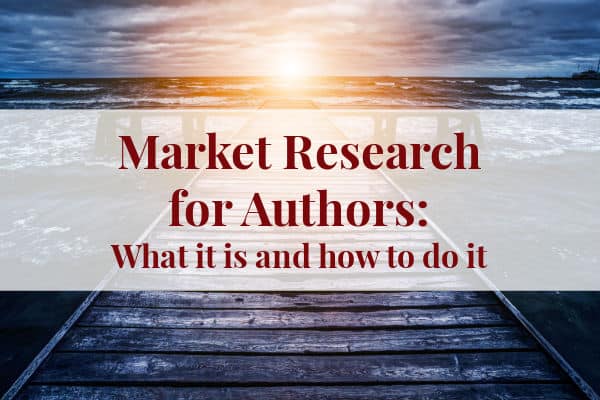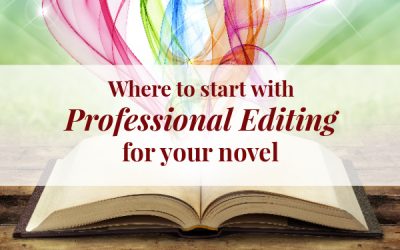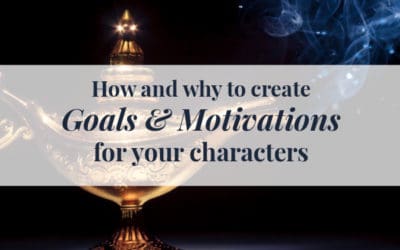An Author’s Guide to Market Research
Authors are business owners, and all business owners need to spend time thinking about marketing.
Don’t worry, this article isn’t about convincing you to do scary business things. It’s about convincing you that one of your (probably) favorite fun activities also counts as productive business time.
One of the best things you can do to help your novel become successful is to do market research.
Market Research for Authors
So what is market research?
For an author, market research means studying the book market in order to figure out what is currently working. Then you can make sure you’re writing a book readers will want, and you’ll have a better idea of what adjustments you need to make to your manuscript during your revisions.
If you plan to self-publish, you’ll need to sell your book to your readers. If you plan to publish traditionally, you’ll have an additional step of selling it to an agent and a publisher.
For either publishing path, you will need to know your genre and its readers and understand how your book fits into the existing market.
And the best way to understand readers is to be one of them.
Read More Books
Market research for authors means reading books.
It’s easier to see the flaws in someone else’s book, since you don’t know it as well, so this is good practice for your own revisions.
As you’re reading, or after you finish the story, notice what you like and dislike about the book. Then try to pin down what specifically makes it work so well, or if it isn’t working, what could have made it work better.
You can also practice thinking about various story elements that you’ll need to focus on when you’re revising your manuscript.
For example, one thing I like to do when I’m reading for fun is to look out for the key plot points throughout the story so I can practice assessing the story structure and get better at identifying structural issues when I’m editing.
What Do You Enjoy as a Reader?
Market research can give you ideas for what you want to add to your book and how you can successfully execute elements that you already have in your story.
It’s important for your book to be unique, but you can still be inspired by other books in and outside of your genre. Reading a lot and reading diversely will make it easier to ensure that you aren’t being overly influenced by any one author.
Your target audience will typically be made up of people who like the same things you like. So for your story, write a book that you would want to read, and incorporate the things that you notice yourself enjoying as a reader.
When you notice that you dislike something about the book you’re reading, try to figure out what specifically you dislike and brainstorm solutions that could have fixed the problem. This will help you avoid similar pitfalls in your book.
This applies to elements of the story that are badly done as well as elements that are done well but that you personally dislike. You’re writing your book for people like you who are likely to dislike similar things.
Reading Reviews
After you read a book, consider looking at the reviews to see what other readers thought. Your readers will be similar to you, but not exactly like you, so it’s valuable to see other perspectives.
The more similar the book is to yours, the more overlap your audiences are likely to have, so reading reviews can help you figure out what readers want and what storytelling choices to make.
If a particular element of the story has put off many reviewers, consider if there’s a way to either avoid that element in your book or to do it in a way that makes it work better.
Reviews are subjective, so always take them with a grain of salt.
Some readers have a bad experience with a book because the book has objective problems, and others simply aren’t the right fit for it. You’re writing for your target audience, not any and every reviewer on the internet.
Look for Comp Titles
If you plan to publish traditionally, think about whether the book could be a good comp title, or comparison title.
A good comp title is a book that was published within the past 2-3 years (sometimes up to 5) and has similar vibes. For example, you could comp to a book for its similar writing style, similar main character, or similar setting.
If you aren’t at the querying stage yet, consider looking for comp titles published in the past year so that they’ll still be current when you’re querying.
The purpose of a comp title is to show the agent or publisher that you’ve done your market research, undestand your genre, and know how your book fits into the current market.
It also shows agents/publishers that your book has sales potential. So the titles you’re comping to should be selling well and show that you’re similar book also has the potential to do well.
Comp Titles to Avoid
Self-published books aren’t comp titles.
If you’re going for traditional publishing, you need a comp title that’s doing well in the traditional publishing context.
A self-published book that does well may not be an indication that a similar trad book selling at trad prices is also going to do well.
It’s common for self-publishers to sell ebooks for low prices in order to increase sales (trading profits for visibility), but traditional publishers need to make a profit in order to stay in business. So self-published books aren’t comp titles for traditionally published books.
Bestsellers aren’t comp titles
Stay away from bestsellers as well, because those are outliers. For example, don’t comp to Fourth Wing—find a different dragon book and/or a different book about a magic school to comp instead.
If an author is a household name (Stephen King, George R.R. Martin, Sarah J. Maas, Colleen Hoover), they’re too big. Their books are going to sell anyway, regardless of whether they wrote a book with marketable content, because their books are automatically marketable through having the author’s name on them.
Choosing Books for Market Research
Here are some guidelines for choosing which books to read for market research.
Pay attention to genre
Choose books in your genre and sub-genre. These are the ones that will be most similar to the books you’re writing. For example, I mostly read epic fantasy, romance, and fantasy romance, because those are the primary genres I edit.
Also read books outside your genre to add variety and get fresh ideas that aren’t being used yet in your genre.
For example, I recently read a historical fiction/horror novel by Victor LaValle called Lone Women. I don’t read much historical fiction or horror, but it was a great book and an excellent example of a modern author doing omniscient POV really well. Omniscient POV is common enough in fantasy that I’ve seen it several times in manuscripts I’ve edited, but it’s hard to get it right, and examples of modern books that do it successfully are few and far between.
Read books readers love
Make sure some of your market research is of popular books. If they’re popular, they must be doing something right. Not necessarily everything, but something. For example, if a book is badly written but it still has many readers who adore it, the author must be doing something right to make those readers love it so much that the writing issues don’t bother them.
If you’re pursuing traditional publishing, traditionally published books are best for market research. If you’re self-publishing, traditionally published books and self-published books are similarly useful as market research.
The big bestsellers are great for market research because they have something that a ton of readers really like. They’re not good comp titles, but you should read them anyway. For books this big, they’re equally valuable as market research whether they’re trad or self-published.
Read recent books (& some of my recommendations)
Books published within the past 2-3 years are the best indicators of the current market. I try to have at least half of the books I read be in this category.
In addition to Lone Women by Victor LaValle (historical horror, 2023), some examples of recent books I’ve read and enjoyed this year are The Tainted Cup by Robert Jackson Bennett (fantasy, 2024), Yellowface by R.F. Kuang (literary fiction, 2023), a Strange and Stubborn Endurance and All the Hidden Paths by Foz Meadows (fantasy romance, 2022 & 2023), Silver Under Nightfall by Rin Chupeco (fantasy romance, 2022), Even Though I Knew the End by C.L. Polk (historical fantasy, 2022), and Legends and Lattes by Travis Baldree (cozy fantasy, 2022). Just to give you some ideas.
Older books can also be worth reading, even if they aren’t as indicative of the current market, especially if they’re still getting a lot of attention. There’s a lot of value in seeing where your genre came from, what has changed since then, and what hasn’t.
I’m currently re-reading The Lord of the Rings for the zillionth time through the audiobook by Andy Serkis. You may know him as Gollum from the films, but he’s an absolutely amazing narrator and can do great normal voices too.
Tolkien is a masterful writer, and even though I’ve read the book many times already, I always end up learning something new about writing and storytelling. In this read-through, I’m thinking a lot about story arcs, both for the series and for each of the 6 books (2 for each of the original 3 volumes) that Tolkien breaks the story into.
Another “older” book I’ve read this year was The Fifth Season by N. K. Jemisin, published in 2015. Every book in the Broken Earth Trilogy won a Hugo award, over the course of three consecutive years, which to my knowledge is the only time that’s ever happened. This is another one that does some unique and interesting stuff with POV. If you write fantasy, or even if you don’t, you should give it a try.
Support your local library
Market research can be completely free if you’re reading books from your library.
And this is one of the best ways to support your library, because they track how many books are being checked out and use that data to justify their funding. So by reading books from your library, you’re helping to ensure that people who don’t have as much money to buy books (like kids) continue having access to good books and literacy.
If you don’t like reading physical books, your library probably also gives you access to free ebooks and audiobooks through platforms like Libby or Hoopla. My library doesn’t have Hoopla, but I use Libby on a regular basis.
I love listening to audiobooks in the car or when I’m cleaning. Sitting down with a book is great, but audiobooks can make boring tasks more fun and help me read more than I’d be able to with just physical books.
Some Audiobook Recommendations
I already mentioned Andy Serkis’s rendition of The Lord of the Rings, which is an absolute work of art, but Moira Quirk’s narration of Gideon the Ninth and the Locked Tomb series by Tamsyn Muir is so perfect that I cannot handle it. And Tamsyn Muir has now replaced George R.R. Martin as my favorite example of deep POV. Her books are just absolutely dripping with deep POV.
So check those out if you’re reading fantasy and trying to get into audiobooks. Some other recent favorite audiobooks specifically that I’ve read this year are Tress of the Emerald Sea by Brandon Sanderson and A Dowry of Blood by S.T. Gibson. Most books make good audiobooks, but I found these especially well done.





